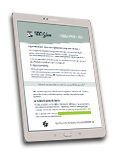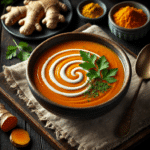Mushrooms and Immune Support: Unveiling Nature’s Immunity Boosters – The Magic of Mushrooms
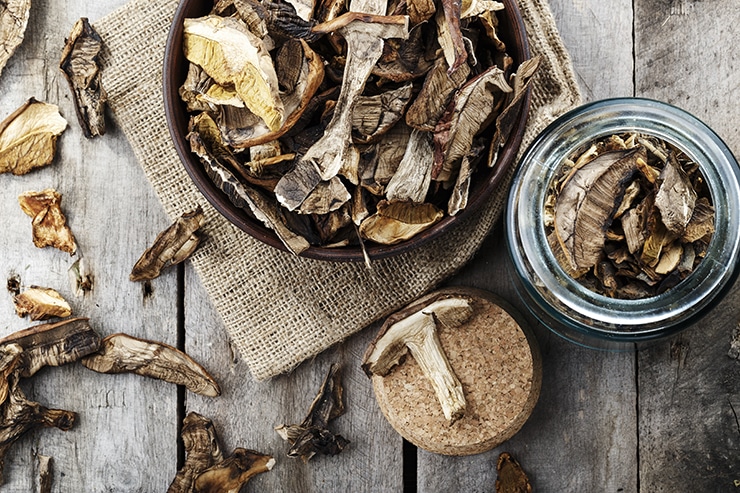
Did You Know?
- There are over 20,000 different mushroom species, at least 50 of which have been determined to influence immune responses.
- Mushrooms are immune modulators – boosting innate immunity, reduce inflammation and they can help treat cancer.
- They are ‘adaptogenic’ – meaning they help your body adapt and perceive less stress.
- To receive their health benefits, you can eat them, have them in tea, or take them as a supplement.
Mushrooms, often celebrated for their unique flavors and culinary versatility, offer more than just a tantalizing taste. Nature has endowed certain mushroom varieties with potent compounds that interact with our immune system, fostering a robust defense against pathogens. From ancient traditions to modern scientific research, the immune-enhancing potential of mushrooms has captured the attention of health enthusiasts and researchers alike. In part two in our series: exploring immune-boosting supplements for fall wellness – let’s dive into the immune boosting magic of mushrooms.
There are over 20,000 different mushroom species, at least 50 of which have been determined to influence immune responses. The common attribute consistent among these species appears to be the polysaccharides, constituents shown to achieve additional immune system support. Polysaccharides from maitake, reishi, and shiitake are believed to be among the most nutritionally supportive for healthy immune function. Wide-ranging health properties of mushroom supplementation include immune support, liver, cardiovascular, healthy glucose metabolism, and cellular health support.
Beta-Glucans: Bridging Mushrooms and Immunity
One of the key mechanisms through which mushrooms bolster our immune system lies in their high content of beta-glucans. Beta-glucans are complex carbohydrates that possess the ability to stimulate various immune cells, including macrophages, neutrophils, and natural killer cells. These immune cells act as the body’s vigilant defenders, swiftly identifying and neutralizing pathogens. The interaction between beta-glucans and immune cells triggers a cascade of responses that heighten the immune system’s surveillance and responsiveness.
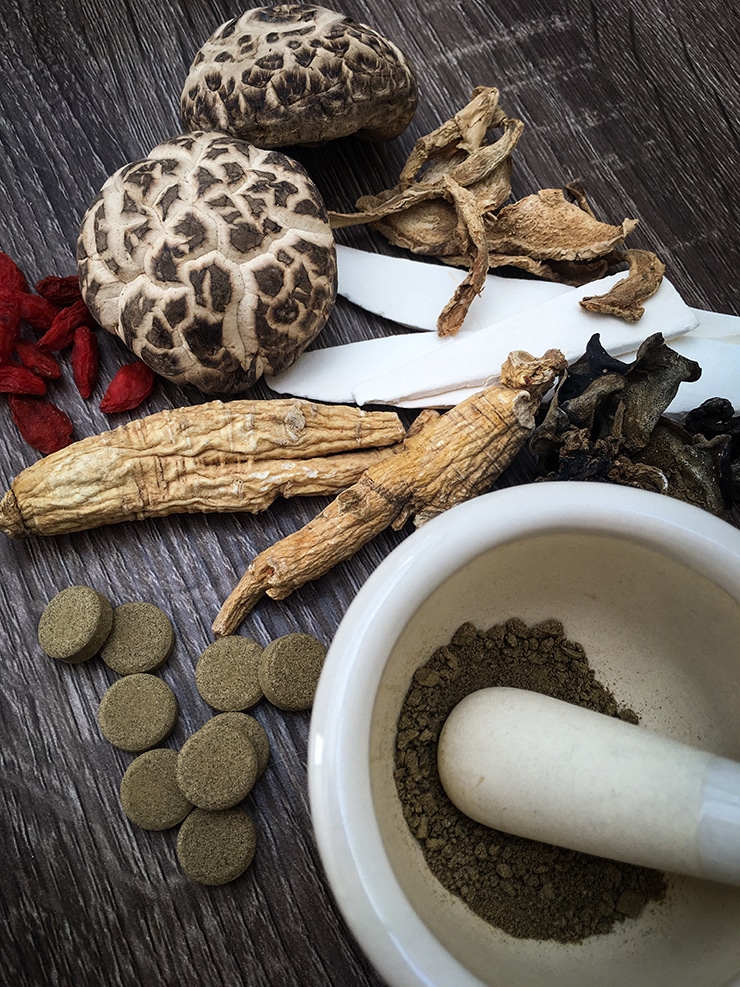
Research has shown that beta-glucans activate immune cells through specific receptors, initiating a series of events that amplify the immune response. For instance, beta-glucans can induce the production of cytokines, small signaling molecules that coordinate immune activities. This immune modulation is pivotal in maintaining a balanced immune response, preventing excessive inflammation while enabling efficient pathogen eradication [1][2].
Immunomodulatory Mushrooms
Mushrooms have been found to support the activity of natural killer (NK) cells, which are a crucial component of the innate immune system. NK cells play a role in recognizing and eliminating infected or abnormal cells in the body. Studies suggest that certain mushroom extracts can enhance the cytotoxic activity of NK cells, bolstering their ability to target and destroy harmful cells [3].
Inflammation is a natural response to infections, but chronic inflammation can contribute to various health issues. Some mushrooms possess anti-inflammatory properties that help regulate the immune response. Compounds present in mushrooms, such as polysaccharides and triterpenoids, have been shown to inhibit pro-inflammatory signaling pathways, thus helping to maintain a balanced immune response [4]. Additionally, mushrooms are rich in vitamins and minerals that contribute to overall immune health.
Adaptogens and Stress Resilience
In our fast-paced lives, stress has become an almost unavoidable companion. Chronic stress can suppress immune function, leaving us more susceptible to infections. This is where certain mushrooms, known as adaptogens, step in to lend a helping hand. Adaptogens possess the remarkable ability to enhance the body’s resilience against stressors, including those that compromise immune function.
Mushrooms like Reishi (Ganoderma lucidum) and Cordyceps (Cordyceps sinensis) are renowned adaptogens. They contain bioactive compounds that promote a balanced stress response by modulating the activity of the hypothalamic-pituitary-adrenal (HPA) axis. By doing so, adaptogens support immune cells’ functionality and improve the body’s ability to adapt to stress without compromising immune defenses [5][6].
Antioxidant Armor: Combatting Oxidative Stress
Oxidative stress, the imbalance between free radicals and antioxidants in the body, can weaken the immune system and contribute to chronic inflammation. Mushrooms come to the rescue with their arsenal of antioxidants. These natural compounds neutralize harmful free radicals, preventing cellular damage and bolstering immune cells’ ability to combat infections.
The antioxidant power of mushrooms is attributed to various compounds, including phenols, flavonoids, and vitamins C and E. For instance, Chaga mushrooms (Inonotus obliquus) boast one of the highest ORAC (Oxygen Radical Absorbance Capacity) values among foods, signifying their exceptional antioxidant capacity. By shielding immune cells from oxidative stress, mushrooms reinforce the body’s immune defense machinery [7].
Immunomodulation: Striking the Balance
A harmonious immune response entails both activation and regulation. Mushrooms excel at this delicate balancing act through their immunomodulatory properties. For instance, Lion’s Mane (Hericium erinaceus) mushrooms contain compounds that stimulate the production of nerve growth factors, promoting communication between nerve cells. This cross talk between the nervous and immune systems facilitates immune regulation and response coordination [8].
Moreover, mushrooms like Shiitake (Lentinula edodes) contain compounds called lectins that can bind to immune cells, modulating their activity. These interactions fine-tune immune responses, preventing excessive reactions while ensuring an effective defense against pathogens. This modulation is particularly valuable in autoimmune conditions where immune responses need careful regulation [9].
Vitamins and Minerals Rich in Mushrooms
Mushrooms are a unique source of various vitamins and minerals that contribute to their nutritional value. Here are some key vitamins and minerals found in mushrooms:
- Vitamin D: Certain mushrooms, when exposed to sunlight or UV light during growth, can naturally synthesize vitamin D, similar to how human skin produces it when exposed to sunlight [11].
- B Vitamins: Mushrooms are a good source of several B vitamins, including riboflavin (B2), niacin (B3), pantothenic acid (B5), and biotin (B7) [10].
- Copper: Copper is a trace mineral that is important for various enzymatic reactions in the body [10].
- Selenium: Selenium is an essential trace element with antioxidant properties [10].
- Potassium: Potassium is a mineral that helps regulate fluid balance, muscle contractions, and nerve signals [10].
- Phosphorus: Phosphorus is a mineral that is crucial for bone health, energy production, and the formation of DNA and cell membranes [10].
- Zinc: Mushrooms contain small amounts of zinc, which is essential for immune function, wound healing, and maintaining healthy skin [1].
- Magnesium: Magnesium is involved in hundreds of biochemical reactions in the body, including energy production, muscle function, and bone health [10].
- Iron: While mushrooms contain non-heme iron (the plant-based form of iron), they can contribute to dietary iron intake [10].
Supplements
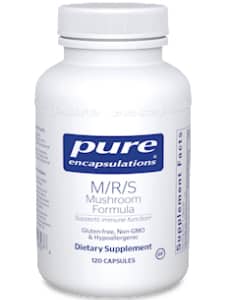 |
M/R/S Mushroom Formula, Pure Encapsulations (Maitake, Reishi and Shiitake mushrooms) 1 capsule twice a day |
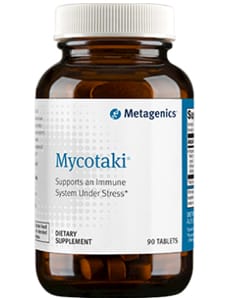 |
Mycotaki, Metagenics (Reishi, Shiitake, Fu-Ling, Turkey Tail, Oyster, Cordyseps, Maitake) 1 tablet twice a day |
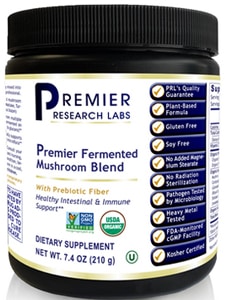 |
Premier Fermented Mushroom Blend, Premier Research Labs This is one of my favorite immune support supplements, containing six different types of organically grown, premier quality fermented mushrooms in their full-spectrum state. This blend is ideal for maximum bioavailability, digestion and absorption. Contains green tea leaf extract, Cordyceps, Reishe, Himematsutake, Shiitake, Maitake, Turkey Tails, as well as ginger, cherry extract and beta glucans. 1 scoop once a day |
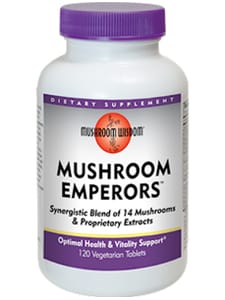 |
Mushroom Emperors, Mushroom Wisdom Contains 13 different mushrooms 1 capsule twice a day |
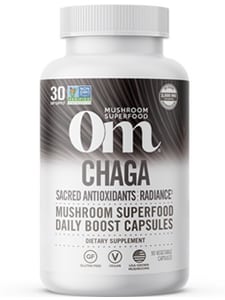 |
Om Mushrooms Chaga, Emerson Ecologics 2-3 capsules a day with water (capsules) |
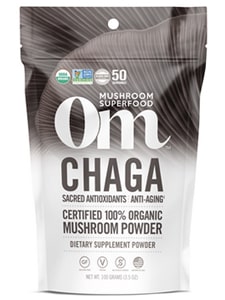 |
Om Mushrooms Chaga, Emerson Ecologics 2 teaspoons daily – add to your smoothie, smoothie or other recipes (powdered version) |
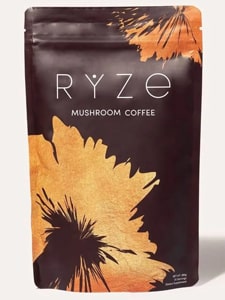 |
Ryze Mushroom coffee that tastes like coffee, but without the jitters. Receive 20% off your order. |
Nature’s Immune Elixir
Mushrooms, long revered for their culinary allure, are emerging as natural allies in supporting immune health. Through their mechanisms of action – from beta-glucans’ immune cell activation to adaptogens’ stress resilience, antioxidant armament, and immunomodulation – mushrooms offer a holistic approach to fortifying our immune system. As scientific research continues to unveil the intricate web of interactions between mushrooms and immunity, these natural wonders stand as a testament to the remarkable potential that nature provides to enhance our well-being.
- Vetvicka, V., & Vetvickova, J. (2021). Glucans and other polysaccharides in immunity. In Mushrooms and Health (pp. 227-239). CRC Press.
- Wasser, S. P. (2017). Medicinal mushrooms in human clinical studies. Part I. Anticancer, oncoimmunological, and immunomodulatory activities: a review. International Journal of Medicinal Mushrooms, 19(4), 279-317.
- Borchers, A. T., Stern, J. S., Hackman, R. M., Keen, C. L., & Gershwin, M. E. (1999). Mushrooms, tumors, and immunity. Proceedings of the Society for Experimental Biology and Medicine, 221(4), 281-293. doi:10.1046/j.1525-1373.1999.d01-47.
- Guggenheim, A. G., Wright, K. M., & Zwickey, H. L. (2014). Immune modulation from five major mushrooms: application to integrative oncology. Integrative Medicine (Encinitas, Calif.), 13(1), 32–44. PMID: 26770156
- Lai, C. Y., Hung, J. T., Lin, H. H., Yu, A. L., & Chen, S. H. (2018). Immunomodulatory and adjuvant activities of a polysaccharide extract of Ganoderma lucidum in vivo and in vitro. The American journal of Chinese medicine, 46(03), 615-635.
- Lee, K. H., & Morris-Natschke, S. L. (2019). Cordycepin (3′-deoxyadenosine) and cordyceps militaris: a potential antitumor agent. In Bioactive Food as Dietary Interventions for Liver and Gastrointestinal Disease (pp. 423-438). Academic Press.
- Wasser, S. P. (2017). Medicinal mushrooms in human clinical studies. Part II. Anticancer, oncoimmunological, and immunomodulatory activities: a review. International Journal of Medicinal Mushrooms, 19(4), 317-368.
- Mori, K., Obara, Y., Hirota, M., Azumi, Y., Kinugasa, S., Inatomi, S., … & Nakahata, N. (2008). Nerve growth factor-inducing activity of Hericium erinaceus in 1321N1 human astrocytoma cells. Biological and Pharmaceutical Bulletin, 31(9), 1727-1732.
- Ng, T. B. (2015). Pharmacological activity of sanchi ginseng (Panax notoginseng). Journal of Pharmacy and Pharmacology, 67(6), 751-765.
- National Nutrient Database for Standard Reference Legacy Release. (2018). United States Department of Agriculture. Retrieved from: https://fdc.nal.usda.gov/
- Mau, J. L., Lin, H. C., & Chen, C. C. (2002). Antioxidant properties of several specialty mushrooms. Food Research International, 35(5), 519-526. doi:10.1016/S0963-9969(01)00170-3
Enjoying this content? Sign up for updates... It's FREE!


